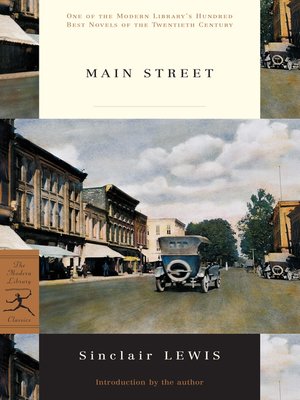
Sign up to save your library
With an OverDrive account, you can save your favorite libraries for at-a-glance information about availability. Find out more about OverDrive accounts.
Find this title in Libby, the library reading app by OverDrive.



Search for a digital library with this title
Title found at these libraries:
| Library Name | Distance |
|---|---|
| Loading... |
Selected by the Modern Library as one of the 100 best novels of all time
With Commentary by E. M. Forster, Dorothy Parker,
H. L. Mencken, Lewis Mumford, Rebecca West,
Sherwood Anderson, Malcolm Cowley, Alfred Kazin, Constance Rourke, and Mark Schorer
"Main Street is the climax of civilization," Sinclair Lewis declared with a typical blend of seriousness and irony. "That this Ford car might stand in front of the Bon Ton Store, Hannibal invaded Rome and Erasmus wrote in Oxford cloisters." Main Street, the story of an idealistic young woman's attempts to reform her small town, brought Lewis immediate acclaim when it was published in 1920. It remains one of the essential texts of the American scene. Lewis Mumford observed: "In Main Street an American had at last written of our life with something of the intellectual rigor and critical detachment that had seemed so cruel and unjustified [in Charles Dickens and Matthew Arnold]. Young people had grown up in this environment, suffocated, stultified, helpless, but unable to find any reason for their spiritual discomfort. Mr. Lewis released them."
Sinclair Lewis (1885-1951), was born in Sauk Centre, Minne-sota, and graduated from Yale in 1907; in 1930 he became the first American recipient of the Nobel Prize in Literature. Main Street (1920) was his first critical and commercial success. Lewis's other noted books include Babbitt (1922), Arrowsmith (1925), Elmer Gantry (1927), Dodsworth (1929), and It Can't Happen Here (1935).
With Commentary by E. M. Forster, Dorothy Parker,
H. L. Mencken, Lewis Mumford, Rebecca West,
Sherwood Anderson, Malcolm Cowley, Alfred Kazin, Constance Rourke, and Mark Schorer
"Main Street is the climax of civilization," Sinclair Lewis declared with a typical blend of seriousness and irony. "That this Ford car might stand in front of the Bon Ton Store, Hannibal invaded Rome and Erasmus wrote in Oxford cloisters." Main Street, the story of an idealistic young woman's attempts to reform her small town, brought Lewis immediate acclaim when it was published in 1920. It remains one of the essential texts of the American scene. Lewis Mumford observed: "In Main Street an American had at last written of our life with something of the intellectual rigor and critical detachment that had seemed so cruel and unjustified [in Charles Dickens and Matthew Arnold]. Young people had grown up in this environment, suffocated, stultified, helpless, but unable to find any reason for their spiritual discomfort. Mr. Lewis released them."
Sinclair Lewis (1885-1951), was born in Sauk Centre, Minne-sota, and graduated from Yale in 1907; in 1930 he became the first American recipient of the Nobel Prize in Literature. Main Street (1920) was his first critical and commercial success. Lewis's other noted books include Babbitt (1922), Arrowsmith (1925), Elmer Gantry (1927), Dodsworth (1929), and It Can't Happen Here (1935).







